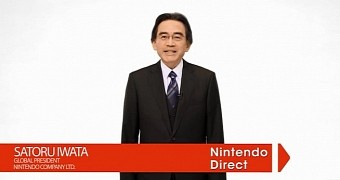Over the weekend, the world of video games in general and Nintendo in particular lost a great man, as Satoru Iwata, the president of the company and one of its leading public faces, died at the age of 55 because of problems with his bile duct.
He had been battling illness for a few years and had limited his appearances at game shows, but no one expected the situation to be so difficult, mainly because he made no announcement about leaving his position or passing on some responsibilities.
Satoru Iwata was the president of Nintendo when the company unleashed the Wii revolution upon the world, delivering one of the most popular gaming devices of the decade and showing what gaming could offer to an entirely new audience.
He also supervised the evolution of the DS and the 3DS handhelds and was also the leader of the company when the Wii U arrived, although the new home console failed to meet the high expectations set for it.
Iwata was also a talented programmer who contributed to active projects at Nintendo even when he had executive positions because he felt he could make sure that they were launched on time and with better overall quality.
He will certainly be missed.
The Great Man theory of video game evolution
But even as we acknowledge the loss of Satoru Iwata, we need to abandon the idea that the video games space is driven forward by a limited number of big developers, some of them already relatively old, who always understood how to deliver progress.
The Great Man theory emerged in the XIX century and explained that all major decisions made by humanity were the result of the interactions between exceptional individuals who wielded uncommon power and had the ability to lead those around them.
Satoru Iwata was, for many gamers, the embodiment of Nintendo, and we all know names like Phil Spencer, Shuhei Yoshida, Peter Moore, Yves Guillemot, Andrew Wilson.
Players tend to criticize or praise these executives for the decisions their companies make and often see them as the figures that drive the future of the gaming industry.
The problem is that such a view underestimates the power of the gamer and the major role that all those employed by the likes of Sony, Microsoft, Nintendo and other companies play when it comes to shaping the way video game software and hardware will look in both the near and the far future.
As the entire world moves into a more social and interactive phase, we all need to offer feedback and to express our opinions in order to drive the evolution of the video game industry.
More companies need Nintendo Direct-like initiatives
Nintendo might not be able to sell all the Wii U consoles it wants at the moment and that forced the company to move closer to its fans, through initiatives like the Nintendo Direct, which Satoru Iwata was often a part of, and the Iwata Asks series.
More companies need to launch similar initiatives so that they have a direct line of communication with those who appreciate their universes and their characters.
Satoru Iwata was celebrated for his leadership and for his programming skills, but one of his biggest qualities was actually his understanding that a video game company is nothing without its audience and that talking to them honestly is a requirement.
Video games are driven forward by the masses of gamers and by all the people working to make them a reality inside both small and big companies, and one way to honor the former Nintendo leader is to simply make sure that we ask other publishers and hardware makers to talk about their products as honestly as possible.

 14 DAY TRIAL //
14 DAY TRIAL //